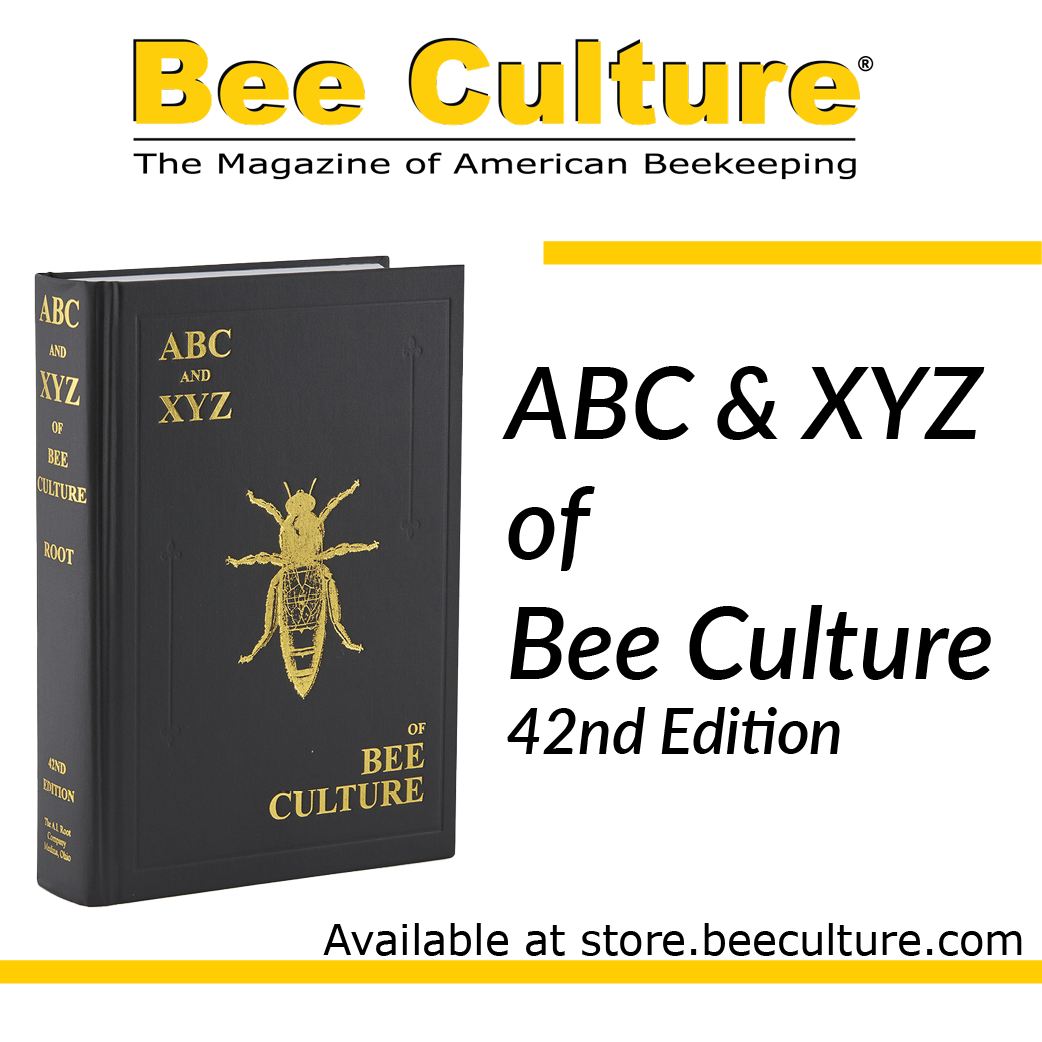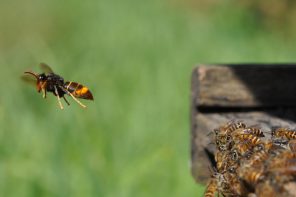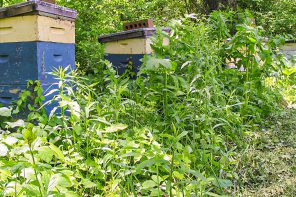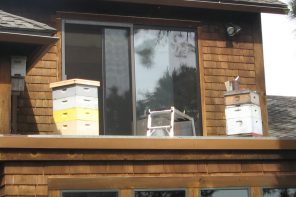Miss Lillian Love
By: Nina Bagley
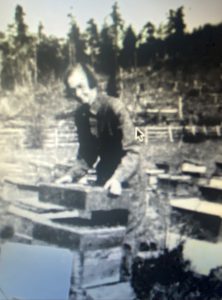 Miss Lillian Love was born into a Quaker family in Marion, Indiana on October 24, 1880. Her family was from Decatur, Indiana. Her father, Granville Love, was born in Indiana. In 1860, he married Nancy J. Gillibrand. Her family came from England and settled in the vicinity of Indianapolis. The two were married on August 11, 1868, in Morgan County, Indiana. Granville was a farmer and ran a huckster wagon, which proved a good business. Mrs. Nancy Love had nine children from 1869 to 1892. She died on January 31, 1936, at eighty-six, in Decatur, Indiana. Lillian’s father, Granville Love, died May 7, 1925, in Guilford, Indiana. All the children would be trained in English and piano at Central Normal College in Danville, Indiana.
Miss Lillian Love was born into a Quaker family in Marion, Indiana on October 24, 1880. Her family was from Decatur, Indiana. Her father, Granville Love, was born in Indiana. In 1860, he married Nancy J. Gillibrand. Her family came from England and settled in the vicinity of Indianapolis. The two were married on August 11, 1868, in Morgan County, Indiana. Granville was a farmer and ran a huckster wagon, which proved a good business. Mrs. Nancy Love had nine children from 1869 to 1892. She died on January 31, 1936, at eighty-six, in Decatur, Indiana. Lillian’s father, Granville Love, died May 7, 1925, in Guilford, Indiana. All the children would be trained in English and piano at Central Normal College in Danville, Indiana.
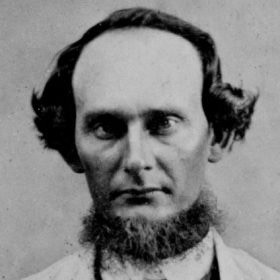
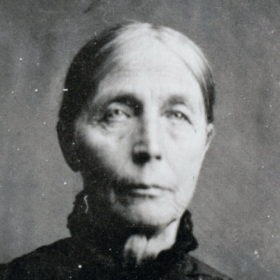
Lillian’s parents, Granville and Nancy Love.
Lillian had two years of college, became a teacher, and taught in Indiana and Florida. Women still couldn’t find jobs other than teaching. Lillian and her youngest sister Flossie were involved in women’s rights and equal opportunity for women; they supported women’s rights to vote.
In 1904, Lillian moved to Tacoma, Washington, where she taught for several years. Finding her husband in 1907, she married Jay Levant Hill, who was twenty-five years older than her. Lillian’s husband, Jay, was an inventor who owned his own lumber business. Lillian said that her husband’s “brain was mechanically bent.”
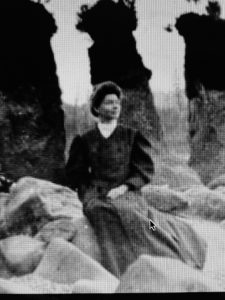
Miss Lillian Love, taken in Washington State prior to her marriage to J. Levant Hill.
Their home would be Mount Shadow Ranch, a two-hundred-acre farm with a charming yellow California-style bungalow, two and a half miles from Elbe, Washington. Surrounding the farm were the bee’s favorite purple hills of fireweed.
Fireweed is a plant that enjoys cool and moist climates and thrives in Pacific Northwest forestlands. It is also considered one of the most prolific plants for honey production, with its nectar having a high sugar concentration. It has a “lightly spicy” or “buttery” flavor.
If you shut your eyes and listen, you can hear the train whistle in the distance as it stops at Park Junction Station in the middle of Mount Shadow Ranch.
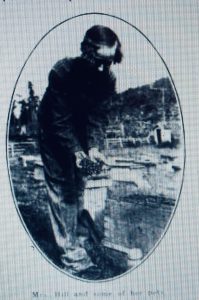
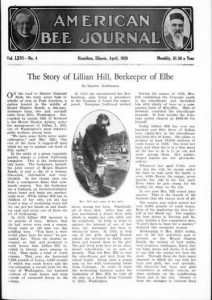
1926 – Lillian Hill at Mt. Rainier
Apiary. Image featured in American Bee Journal
“We have some thirty acres under cultivation,” said Mrs. Hill; The rest of the farm is logged-off land which we use to pasture our herd of fifty cattle.”
—American Bee Journal, April 1926.
One day in 1913, an old man came peddling bees. “You have a wonderful place here for bees,” he said, convincing Mrs. Hill to invest in six swarms. Before the older man came along, she had never seen a swarm of bees before. Her six swarms increased and produced so much honey that in 1914 Lillian Hill invested in twenty more swarms, giving her forty hives. That year she harvested 6,500 pounds of pure honey. Lillian had an entrepreneurial spirit and determination to succeed in a male-dominated industry.
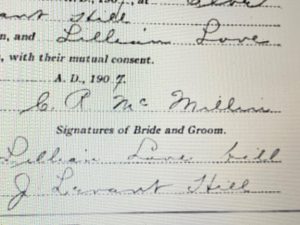
Lillian’s marriage to J. Hill.
I don’t know how she accomplished so much. Mrs. Lillian Hill kept a tidy home, raised beef cattle, Duroc-Jersey hogs, geese and ducks, and grew vegetables in the garden. But it would be the bees she loved the most!
Lillian was part owner of the Ranch and owner of the Mount Shadow Apiary. She had a gentle personality. She was independent and had a fire in her eyes that you could see demanded respect.
Being a novice beekeeper found her unprepared. In 1915, she encountered her first obstacle, European Foulbrood that would bring havoc to her beeyard. Words that no beekeeper wanted to hear or experience, the only cure, the dreadful burning of the hives. After that horrible experience with “American Foulbrood,” she only kept a dozen colonies of bees providing honey for her family and neighbors. (American Bee Journal, April 1926.)
“I never camp,” confessed Lillian Hill. “On either the trail of my successes or my failures. I go right on.” That’s her philosophy in a nut-shell.
Although childless, she cared for the children from reform schools, orphan asylums or neighboring farms; she taught the boys and girls everything about beekeeping so they could pay their way through school. She believed that the best and safest way to help any human being is to help him help himself. Particularly, those who needed guidance and education.
In the 1900s, the U.S. was a diverse nation, and its children lived in various circumstances. For years, she had been the leader of the Boys’ and Girls’ Bee Club of Elbe. One of her boys won nearly $80.00 with his exhibits of bees and honey at the Western Washington Fair.
Lillian increased her hives to twenty-six to help one of her boys and it didn’t stop there!
In 1924, to help one of her girls through school, she invested in thirty more hives and loaned them to the girl. The girl lived next door to an abandoned schoolhouse on an acre of ground, which got Mrs. Hill thinking, “I could rent the schoolhouse and land from the school board.”
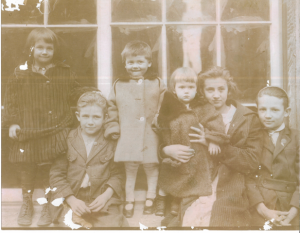
1921 – Freddie May with his siblings before they were placed in the Washington Children’s Home.
One day in 1924, a young man showed up at the Ranch. His name was Freddie May, and he was born in 1912 in Denver, Colorado. When he was eight years old, he lived in Wenatchee, Washington. His father abandoned the family, and their mother could not care for six children. The children were placed in the Washington Children’s Home in Wenatchee, Washington, in 1921.

Mount Rainier Apiary. Freddie May and Mrs. Lillian Hill.
Freddie somehow got his hands on a newspaper. He came across the ad for a permanent position in beekeeping work. Freddie wanted to learn about the beekeeping business under the leadership of Mrs. Lillian Hill, so he rode on “a bicycle” from Wenatchee, Washington to Elbe, Washington, a hundred and ninety five miles! He was energetic and full of fire and wanted to learn beekeeping.
Lillian took a liking to Freddie and wanted to help him make money to pay his way through school, so she furnished Freddie with plenty of bees on a commission basis of fifty-fifty. In four months, the Colorado cyclist made five hundred dollars for himself.
Freddie would consider Mrs. Lillian Hill his mother and next of kin. Lillian and her husband would become Freddie’s foster parents giving him a home with security. He would attend Eatonville High School and work on the Ranch. He would continue beekeeping and eventually marry and have a family.
During the season of 1925, Mrs. Hill was able to establish the Colorado youth in the schoolhouse helping young boys and girls in need teaching them beekeeping.
In 1926, Lillian Hill had over one hundred and fifty hives of Italian bees, eighty-five at the schoolhouse and sixty-five at home. She produced at least 10,000 sections of comb honey. Mrs. Hill would advertise in the newspapers to get workers “Wanted – an experienced farmer for a permanent position.”
Most of the marketing she did herself in her Buick car. She supplied the best stores in Tacoma and Seattle. “I don’t have to hunt for a market,” declared this energetic woman. In one year, Mrs. Hill raised sixty queens. That was the part of her business that she enjoyed most of all. Mrs. Hill was the president of the Pierce County Beekeepers’ Association for two years.

Mount Rainier
Both triumphs and disasters have knocked often at Lillian Hill’s door on the Mount Shadow Ranch, but neither one ever fazed her. This woman had grit and plenty of it!
Around 1927, Freddie would accidentally run over Lillian’s foot crushing it while she was teaching him how to drive the tractor. An unfortunate outcome was that the doctors had to amputate her leg due to blood poisoning. Lillian had a prosthetic leg from the knee down, but that didn’t stop her. She took it in stride and persevered. In 1929, unfortunately, her husband died. He was the youngest of five and the last of his siblings. He was seventy-one years old. I will say some lives have more trial or tribulations than others, to be sure, but no life is without events that test and challenge us.
In the 1930 census, Lillian is listed as a widow forty-nine years old, with fifty men aged eighteen to sixty-six listed as boarders at the Mount Shadow Ranch and working for Lillian Hill. That’s a lot of men to manage. You would have to have grit and be firm! Among the fifty men working on the farm was Freddie May, the youngest, who was eighteen. His occupation was a Logger.
Not being able to care for the Ranch and losing her husband, not to mention the tractor accident, left her feeling like it would be time to sell the Ranch. Lillian Hill would place the Ranch up for sale.
Advertised in the Tacoma Daily Ledger Sunday, June 23, 1929. “Mountain Shadow Ranch. It is one of the best-stocked Dairy Farms in western Washington, with running water in every field and excellent soil. Forty acres cleared; 120 acres fenced for hogs and cattle; stocked and making money; good seven-room house with school buses to Elbe and Eatonville high school. The farm is a must-see to appreciate it. We will consider small trade—a price of $15,000. Write to Lillian L. Hill for an appointment.”
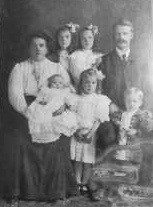
Family photo of Albert Cook, first wife Nora and their children.
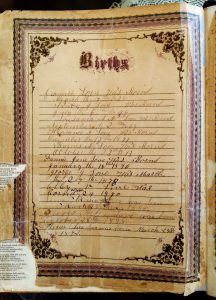
Lillian’s family Bible.
A lot happened in 1930. The Ranch sold, and Lillian Hill married Albert Cook, a widower who worked in the lumber industry. His wife Nora passed away in March of 1929 at the age of fifty-one; they had six children together. Lillian didn’t mind an extended family. She was raising her niece Esther who she adopted at a young age and her foster son Freddie May. After all, Lillian loved children and teaching. Her first husband was in the lumber business so she probably knew Albert Cook.
Albert would marry Lillian in 1930, build apartment buildings and retire from the lumber industry. The two would live in Tacoma, Washington. Lillian’s beekeeping days came to an end, her new occupation would be owner and landlord of her apartment buildings.
Lillian had a very loving relationship for nineteen years with her husband Albert. In May of 1949, Albert passed away at the age of seventy-three. He was buried beside his first wife, Nora, in Tacoma, Pierce, Washington.
The income from the apartments and other investments would give Lillian a comfortable life for the next sixteen years. She lived to be eighty-eight and passed away August 19, 1969 in Tacoma, Pierce, Washington Lillian was a Sixth Avenue Baptist church member. She was buried next to her first husband, Jay Levant Hill.
Freddie May lived to be eighty-three years old. Freddie kept his surname May. He went by Fred (Cook) May, Sr. “Commander” as best by everyone who loved him.
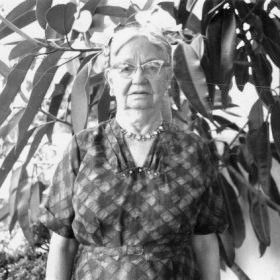
Lillian in her sister Flossie’s backyard. Her dress is purple and black print. She and her sister Flossie always had a matching rhinestone necklace.
Lillian’s youngest sister Flossie, who she remained close with, lived in California. Flossie had a granddaughter Karla who enjoyed her aunt Lillian’s visits. She remembers sitting on her grandmother’s hunter green “davenport” with her aunt Lillian. Her grandma Flossie would sit in her desk chair across the room and the two sisters would talk for hours.
Lillian’s great-niece Karla also remembers how “intriguing” her aunt was. Lillian had blue eyes, was fair-haired and had rosy cheeks. She wore her hair in a braid reaching her waist until one day; she cut it off, curled it up, and put it in a small box for keeping. Karla remembers her Aunt Lillian as sweet but at the same time, tough and gutsy!
Marcus Aurelius was a stoic philosopher. His quote reminded me of Mrs. Lillian Love, her struggles as a woman in the 1900’s and how she put others before her, passing her knowledge about beekeeping on to so many young boys and girls in need. I would like to thank Lillian’s great-niece Karla Babcock for sharing her memories of her Aunt Lillian and grandmother Flossie.
“A life of sacrifice and putting the well being collective first, just like the bees.”
—Marcus Aurelius
Ohioqueenbee
Nina M. Bagley
Columbus, Ohio.





